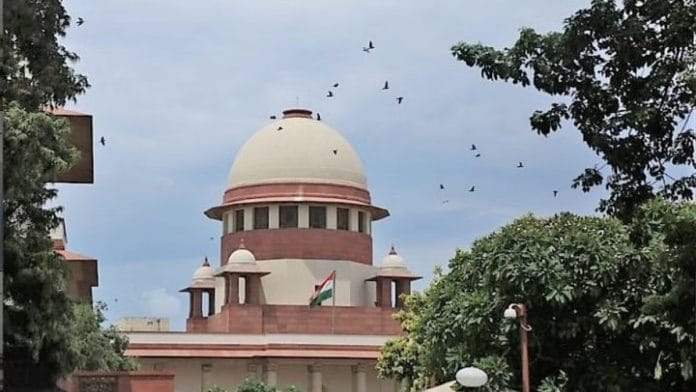New Delhi: From fixing definite timelines for appeal against decisions to including critical details such as the appearance of parties in orders — the Supreme Court has attempted to plug significant gaps in the Juvenile Justice (Care and Protection of Children) Act (JJA), 2015.
The JJA outlines procedures for handling legal violations by minors, managed by the Juvenile Justice Board (JJB), which also fulfils various socio-legal roles.
A bench of justices C.T. Ravikumar and Rajesh Bindal on 7 May ruled that an appeal against the JJB order should be filed within 30 days and also made it mandatory for the board to mention details, such as reasons for adjourning the hearing in a case in its orders.
The SC was dealing with an appeal in a criminal case involving charges of rape and wrongful confinement under the Indian Penal Code (IPC) and the Protection of Children from Sexual Offences Act (POCSO) when it gave the judgment, which is set to have far-reaching implications in cases involving minors.
The case in question revolved around an appeal against the Children’s Court’s decision to treat the appellant as an adult rather than a “child in conflict with law” — a term used when a minor is accused of an offence. This decision, affirmed by the Karnataka High Court, was upheld by the Supreme Court.
A Session Court deals with ordinary criminal offences, while a Children’s Court is a specialised court that deals with heinous offences involving minors.
According to the JJA, a minor who encounters the criminal justice system due to an alleged offence is identified as a “child in conflict with law”. In such cases, the standard criminal procedures are set aside, and instead, the case is presented before the JJB.
The JJB is endowed with the authority to adjudicate matters concerning minors, ensure they have access to legal representation, and oversee the conditions of juvenile residential establishments.
Should the board conclude that the minor should face trial as an adult, it will issue an order to that effect, which is subsequently forwarded to the Children’s Court for a final decision.
In a detailed order spanning over 70 pages, a copy of which is with ThePrint, the judges noted significant lacunas in the JJA, particularly the absence of a defined timeline for appealing JJB decisions or for condoning delays in assessing whether an offence is heinous.
Also Read: EWS seats in pvt schools: Can’t use deadline to deny admission to shortlisted student, says Delhi HC
‘No timeline for appeal’
In its order, the court pointed out that there was no set deadline for challenging the JJB’s decisions or for forgiving any late decisions about whether an offence was heinous, which should be determined by the Children’s Court.
Notably, heinous offences are not adjudicated by the JJB but are referred to the Children’s Court, a specialised tribunal for such cases involving minors.
The court perceived this as a legislative oversight that despite the provision for an appeal, no specific deadline was established.
“In order to make the Act workable and put timelines for the exercise of the statutory [legal] right of appeal, which is always there, we deem it appropriate to fill up this gap, which otherwise does not go against the scheme of the Act,” the Court said.
Drawing from another section of the JJA that addresses appeals against decisions made by the Committee or the Board, the SC determined that appeals should be filed within 30 days following any order by the committee or board. Additionally, the appellate authority is granted the power to forgive or extend this deadline to accommodate appeals in appropriate situations.
The court also addressed the interchangeable use of “Children’s Court” and “Court of Sessions” within the Act, noting the frequent absence of a clear appellate process.
“In the sense where Children’s Court is available, even if the appeal is said to be maintainable before the Sessions Court, it has to be considered by the Children’s Court. Whereas, where no Children’s Court is available, the power is to be exercised by the Sessions Court,” the judgment explained.
This interpretation ensures that in situations where the JJ Act directs appeals to the Sessions Court instead of the Children’s Court, or vice-versa, the provision will encompass both courts. This ensures that minors have the opportunity to appeal decisions in situations where the alternate court was not previously specified — safeguarding their rights within the judicial system.
‘Decisions passed skipping critical details’
The Supreme Court also highlighted the issue of judicial orders being issued without including essential information such as the names of the decision-makers or the attendance of involved parties and their legal representatives.
In this part of the order, the SC did not limit such observations only to the JJA but noted that this was frequently observed in cases where “judicial members” or “non-judicial members” decide cases in quasi-judicial bodies.
Quasi-judicial bodies are those that fall outside the traditional court structure of the judiciary but still perform similar functions, such as the National Green Tribunal.
“The presiding officers or members of the board, as the case in hand, or tribunals do not mention their names when the order is passed. As a result of which it becomes difficult to find out later, as to who was presiding the court or board or tribunal or was the member at the relevant point of time,” the court observed.
The SC added that it was also relevant to identify those who seek adjournments before the court or delay the matter so that relevant penalties could be imposed on them at a later stage in the proceedings.
Akshat Jain is a student of the National Law University, Delhi, and an intern with ThePrint.
(Edited by Richa Mishra)






